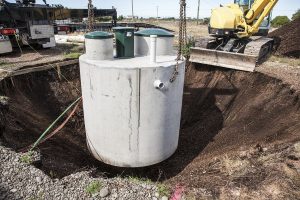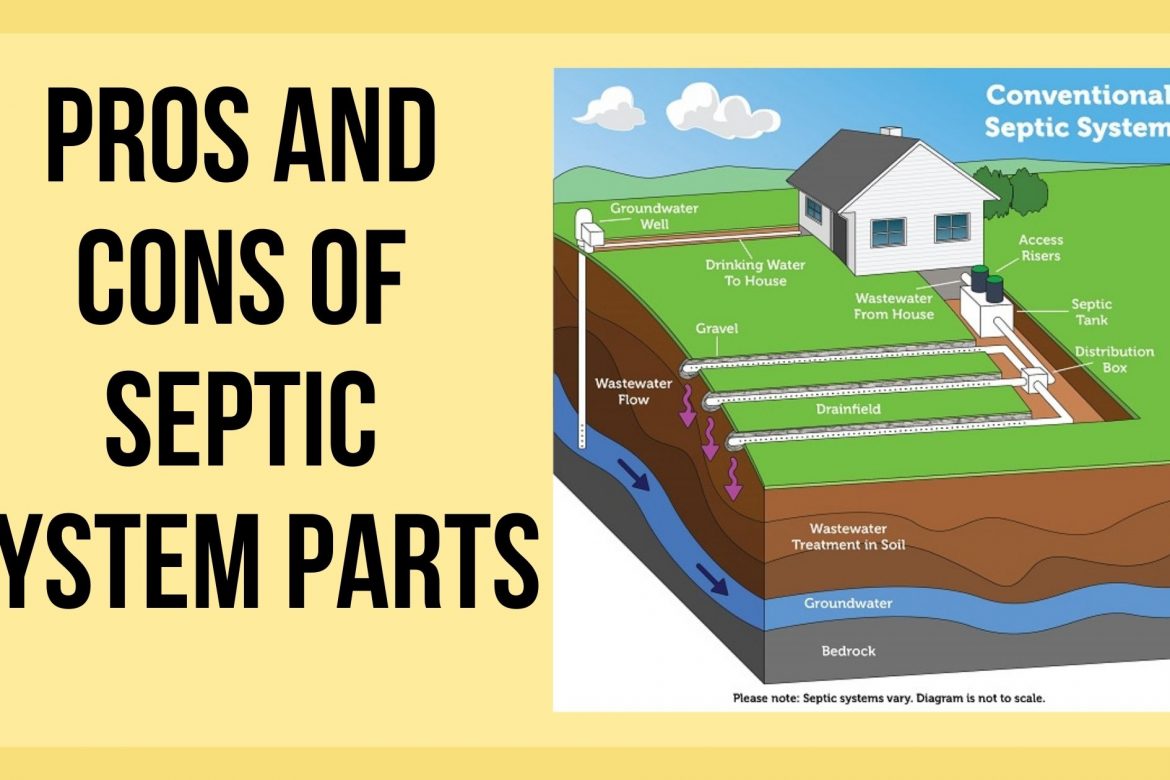Pros and Cons of Septic System Parts
A dedicated on-site septic tank system is one of the two main methods of discharging wastewater from residential and commercial facilities. This septic system requires a septic tank to be buried somewhere beside or behind the underground property.
A septic tank collects wastewater from toilets, showers, bathtubs, and other domestic drains. In a septic tank, solid waste settles to the bottom, forming what is called a sludge layer.
As much oil and grease as there is in the wastewater floats to the top and forms a layer of foam. Septic tanks have T-shaped chambers and outlets to prevent sludge and sludge from leaving the tank and entering your sewer. Only the sewage (or sewage) leaves the septic tank and goes into the sewer.
 A septic tank system has many advantages that make it better than septic tanks for many people. Whether you prefer one or the other depends on whether you have an independent and responsible sewer system or whether you prefer the reliability and convenience of sewer lines.
A septic tank system has many advantages that make it better than septic tanks for many people. Whether you prefer one or the other depends on whether you have an independent and responsible sewer system or whether you prefer the reliability and convenience of sewer lines.
 The disadvantages of septic tanks stem from the fact that maintenance and repairs are the responsibility of the homeowner. The capacity of sewer systems is also somewhat more limited than sewer pipes:
The disadvantages of septic tanks stem from the fact that maintenance and repairs are the responsibility of the homeowner. The capacity of sewer systems is also somewhat more limited than sewer pipes:
Advantage of Septic System Parts
 A septic tank system has many advantages that make it better than septic tanks for many people. Whether you prefer one or the other depends on whether you have an independent and responsible sewer system or whether you prefer the reliability and convenience of sewer lines.
A septic tank system has many advantages that make it better than septic tanks for many people. Whether you prefer one or the other depends on whether you have an independent and responsible sewer system or whether you prefer the reliability and convenience of sewer lines.
- Septic tank diversification: The main advantages of different types of septic tank systems range from durability and strength to low maintenance. Whether the type of tank is known for one quality or another depends on the material. However, tanks also have weaknesses in terms of material composition. Therefore, all types of septic tanks have advantages and disadvantages, which generally fall into the following categories:
- The glass fibre tanks: Fiber glass septic tanks are not sensitive to the major weaknesses of concrete and steel tanks. Unlike concrete tanks, fiberglass tanks will not crack, and unlike steel tanks, fiber glass tanks are rust-resistant. However, fiber glass septic tanks sometimes contain small amounts of sewage, usually as a result of moving piles to the bottom of the tank. A fiberglass tank is also lighter than other types of tanks, making it more susceptible to the weight above the ground and more sensitive to potential movement if the surrounding ground becomes wet.
- Aerobic tank septic tank: Electrically operated pneumatic septic tanks are often installed when previous tanks do not have special features. Air tanks are up to three times more expensive to sell than other types of septic tanks, but they are more efficient and require fewer drainage fields. Although they often require frequent and thorough maintenance, air tanks generally last for several years.
-
Obtain some cash
-
Highly Efficient for Saving Money
Disadvantages of Septic System Parts
 The disadvantages of septic tanks stem from the fact that maintenance and repairs are the responsibility of the homeowner. The capacity of sewer systems is also somewhat more limited than sewer pipes:
The disadvantages of septic tanks stem from the fact that maintenance and repairs are the responsibility of the homeowner. The capacity of sewer systems is also somewhat more limited than sewer pipes:
- Required Maintenance: One of the main disadvantages of sewage systems is the need for their maintenance. While septic tank maintenance is managed by the city, the cost of septic tank maintenance should be borne by the homeowner. A septic tank should be pumped every three to five years to avoid flooding.
- Sometimes it needs to be replaced: Unlike sewage systems, sewage systems cannot treat the volume of effluent above a certain threshold. Therefore, if the sewage system is filled with a large amount of sewage, it may fail. When this happens, the cleaning process can be difficult and expensive.
- Unaware of maintenance
In a nutshell
Knowing the proper and necessary methods of septic tank care and maintenance can extend the life of the on-site wastewater treatment system and increase its performance. The above-listed points will be helpful for you to use the septic system more efficiently. Whether you prefer one treatment plant or another largely depends on whether you, as the owner, have the authority and responsibility to maintain your sewer system, or whether you prefer the security and convenience of a healthy connection to a central sewer system. Whatever decision you make, the most important thing is to be prepared for an emergency and to have a trusted plumber you can trust for routine plumbing work.
Read More
Categories:
Septic System

